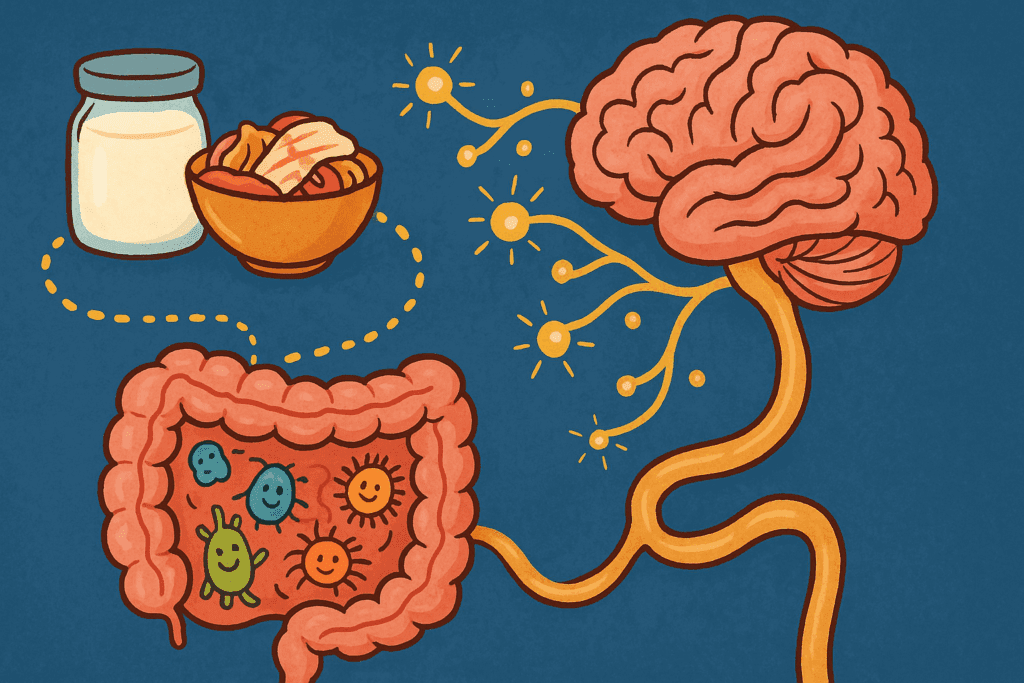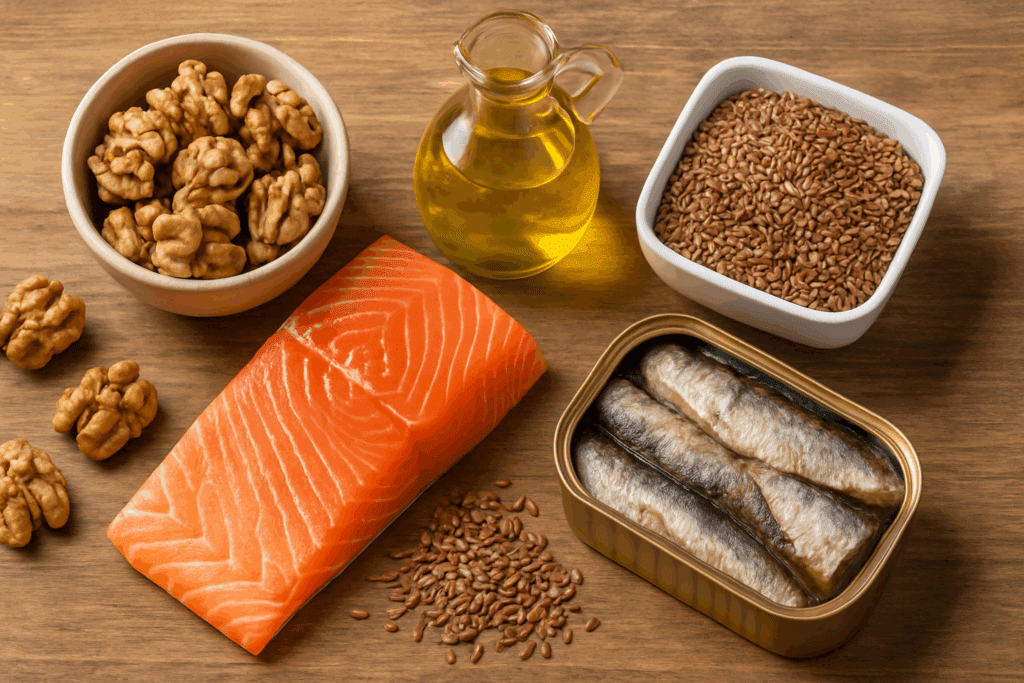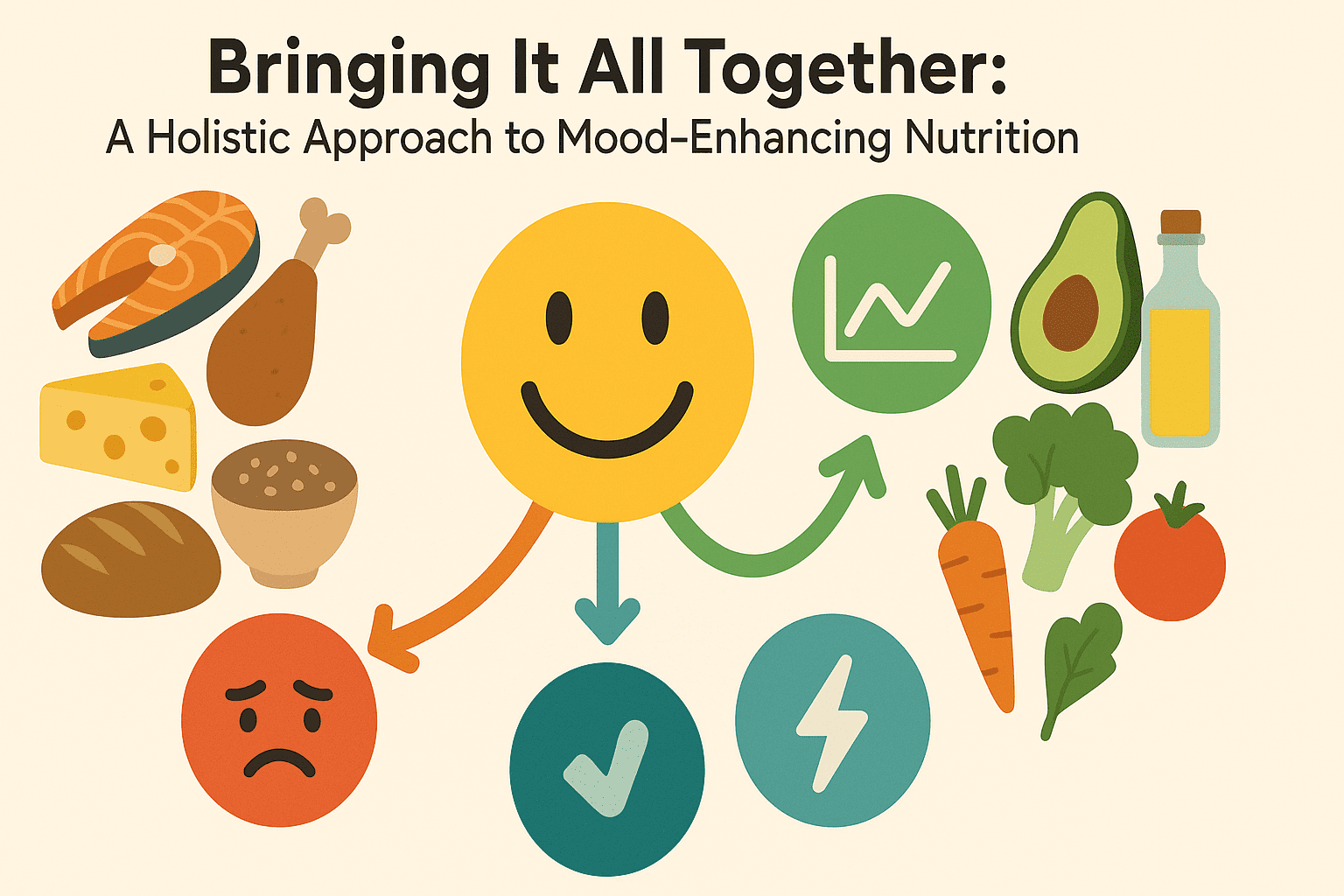Modern life is filled with pressure, deadlines, and emotional strain, all of which can take a toll on our mental health. Amid this fast-paced existence, it’s easy to overlook the subtle yet profound connection between our diet and our mood. The food we eat fuels not only our physical body but also shapes our emotional state, brain chemistry, and overall mental wellness. While therapy, exercise, and sleep are pillars of emotional well-being, nutrition often acts as a silent partner in the background. Understanding which foods are good for mood and how they affect our emotional health is crucial for creating a sustainable, holistic lifestyle. As science continues to explore the gut-brain connection and the nutritional basis of mental health, we are uncovering the vital role of dietary choices in managing anxiety, depression, and emotional fatigue.
You may also like: How to Stop Emotional Eating and Regain Control: Mindful Nutrition Strategies That Support a Healthier Lifestyle
Research increasingly confirms that the foods we choose have biochemical implications that extend beyond simple caloric intake. Nutrients like omega-3 fatty acids, tryptophan, magnesium, and various vitamins work synergistically with our brain’s neurotransmitters, contributing to feelings of calm, happiness, and cognitive clarity. Therefore, when considering foods that improve mood, it’s essential to think not only about the ingredients themselves but also about how these foods integrate into our daily routines and overall health strategies. In this article, we’ll explore the best foods to eat to improve mood, understand the science behind how these foods that make you happy work on a biochemical level, and offer evidence-based insights to support lasting mental wellness.

The Gut-Brain Connection: Why Food Affects Mood
One of the most significant discoveries in recent years in nutritional psychiatry is the deep and dynamic relationship between the gut and the brain. This bidirectional communication is known as the gut-brain axis, and it has reshaped our understanding of how food influences emotions. The gut is home to trillions of microbes that not only assist with digestion but also produce a variety of neurochemicals, including serotonin, dopamine, and gamma-aminobutyric acid (GABA), all of which play a critical role in mood regulation. In fact, around 90% of the body’s serotonin is produced in the gut, not the brain, which explains why gastrointestinal health is so intimately tied to emotional stability.
Consuming foods that support gut health is, therefore, indirectly a way of supporting mental health. Fermented foods like yogurt, kimchi, sauerkraut, and kefir are rich in probiotics that nourish the gut microbiome. When the microbiome is thriving, it can modulate inflammation, enhance neurotransmitter activity, and improve the integrity of the intestinal barrier, preventing the so-called “leaky gut” phenomenon that has been linked to mood disorders. Prebiotic fibers found in foods like onions, garlic, bananas, and asparagus also contribute by feeding beneficial gut bacteria, creating an environment conducive to emotional balance. This evidence suggests that the right foods to eat to improve mood may begin not in the brain, but in the digestive tract.

Omega-3 Fatty Acids: Brain Fuel for Better Moods
Omega-3 fatty acids are polyunsaturated fats that play a fundamental role in brain health. Found primarily in fatty fish like salmon, mackerel, sardines, and in plant sources such as flaxseeds and walnuts, these fats are crucial for maintaining the fluidity of cell membranes in the brain. Scientific studies have shown that omega-3s, particularly eicosapentaenoic acid (EPA) and docosahexaenoic acid (DHA), can reduce symptoms of depression and improve emotional resilience. By reducing neuroinflammation and supporting synaptic plasticity, omega-3s essentially make it easier for brain cells to communicate, enhancing mood stability and mental clarity.
These fatty acids are also known to influence dopamine and serotonin levels, further solidifying their reputation as a key nutrient for mood enhancement. People who regularly consume omega-3-rich foods report lower levels of anxiety and emotional distress, highlighting their effectiveness as foods that improve mood. In addition to their neurological benefits, omega-3s have cardiovascular and anti-inflammatory properties, creating a cascade of health benefits that extend well beyond mental wellness. Including these fats in your weekly diet is a practical and scientifically grounded way to feel more emotionally balanced.

Complex Carbohydrates and Their Impact on Serotonin
Contrary to popular belief, carbohydrates are not the enemy—especially when it comes to mood. In fact, complex carbohydrates play a vital role in serotonin synthesis, one of the neurotransmitters most associated with feelings of happiness and well-being. Whole grains like oats, quinoa, brown rice, and whole wheat bread allow for a slow, steady release of glucose into the bloodstream, which helps maintain stable blood sugar levels and reduces mood swings. These foods also provide essential nutrients like B vitamins, which support neurological function and emotional health.
The consumption of complex carbohydrates encourages the release of insulin, which in turn facilitates the transport of tryptophan—the precursor to serotonin—into the brain. Once inside the brain, tryptophan is converted into serotonin, providing a natural boost to mood. This process underscores why whole grains and other low-glycemic-index foods are good for mood. Rather than spiking energy levels only to cause a crash, complex carbs provide a stable foundation for emotional equilibrium throughout the day.

Protein-Rich Foods: Building Blocks for Emotional Health
Protein is essential for the production of neurotransmitters and other molecules that affect our mood and cognition. Amino acids, the building blocks of protein, serve as precursors for neurotransmitters like dopamine, norepinephrine, and serotonin. Foods such as eggs, lean meats, dairy, legumes, and tofu offer high-quality proteins that can directly impact how we feel. For instance, eggs contain significant amounts of choline and tryptophan—two nutrients associated with improved mood and cognitive performance.
Including protein in every meal also helps regulate blood sugar levels, preventing the mood crashes that often accompany high-sugar or high-carb meals. Additionally, protein-rich foods are more satiating, helping to stabilize hunger and reduce emotional eating, which is a common coping mechanism for anxiety and stress. The scientific consensus suggests that a balanced intake of protein supports both physiological and psychological health, making it an indispensable part of a mood-supportive diet. By ensuring consistent intake of high-quality proteins, we can better support the biochemical pathways that help us feel energized and emotionally resilient.
Magnesium, Zinc, and Iron: The Underrated Mood Minerals
Micronutrients like magnesium, zinc, and iron often receive less attention than macronutrients, but they are no less important for mental health. Magnesium is involved in over 300 enzymatic reactions in the body and has a calming effect on the nervous system. Low magnesium levels have been linked to symptoms of anxiety, irritability, and even depression. Leafy greens, nuts, seeds, and whole grains are excellent sources of this mineral and should be considered among the foods that are good for mood.
Zinc plays a crucial role in neurogenesis and the regulation of neurotransmitters. Deficiencies in zinc are correlated with increased rates of depression, and supplementation has been shown to enhance the effectiveness of antidepressant treatments. Foods such as oysters, pumpkin seeds, chickpeas, and cashews are rich in zinc and offer an easy way to support emotional well-being. Iron, meanwhile, is essential for oxygen transport and energy metabolism. Low iron levels can result in fatigue and cognitive fog, both of which can contribute to feelings of sadness or anxiety. Iron-rich foods like lean red meat, spinach, and legumes help maintain cognitive sharpness and emotional balance.
Antioxidant-Rich Fruits and Vegetables: Defenders Against Mood Disorders
Oxidative stress and inflammation are increasingly recognized as underlying factors in many mood disorders, including depression and anxiety. Antioxidants combat these damaging processes by neutralizing free radicals and reducing cellular damage. Fruits and vegetables are particularly rich in antioxidants like vitamin C, vitamin E, flavonoids, and carotenoids, which play a protective role in brain health. Berries, for instance, are not only delicious but also packed with anthocyanins and other polyphenols that can improve cognitive function and mood.
Leafy greens such as kale and spinach contain folate, a B vitamin essential for neurotransmitter synthesis. Low folate levels have been associated with depressive symptoms, and increased folate intake has been shown to improve mood in clinical settings. Colorful vegetables like bell peppers, carrots, and sweet potatoes provide a spectrum of nutrients that work synergistically to support emotional well-being. By filling your plate with a rainbow of produce, you’re not only nourishing your body but also creating a nutritional shield against mental fatigue and mood disorders. This makes antioxidant-rich produce some of the best foods that make you happy in both a literal and metaphorical sense.

Dark Chocolate and Mood: A Guilt-Free Pleasure
Dark chocolate often makes the list of foods that improve mood—and for good reason. This indulgent treat contains a unique combination of compounds that have mood-boosting properties, including theobromine, phenylethylamine, and flavonoids. These compounds can stimulate the release of endorphins and serotonin, providing a mild euphoric effect that lifts spirits. Additionally, dark chocolate is a rich source of magnesium and antioxidants, further supporting its role in emotional wellness.
It’s important to note, however, that not all chocolate is created equal. The mood-enhancing benefits are primarily associated with dark chocolate that contains at least 70% cocoa and minimal added sugars. Overconsumption of sugary or processed chocolate can lead to mood crashes and energy dips. When consumed mindfully and in moderation, dark chocolate can be a delicious and scientifically backed addition to your diet. Its ability to improve mood while satisfying cravings makes it a rare food that is both pleasurable and purposeful.
Coffee and Tea: Caffeine’s Double-Edged Sword
Caffeine is one of the most widely consumed psychoactive substances in the world, and it has a well-documented impact on mood and alertness. Found in coffee, tea, and some energy drinks, caffeine works by blocking adenosine receptors in the brain, thereby increasing the availability of dopamine and other neurotransmitters that influence mood. Moderate caffeine consumption has been linked to improved focus, reduced fatigue, and even lower risk of depression.
However, the relationship between caffeine and mood is not entirely straightforward. While small to moderate amounts can be uplifting, excessive consumption may lead to anxiety, irritability, and disrupted sleep patterns, all of which can negatively affect emotional health. Tea, especially green tea, offers a gentler alternative due to the presence of L-theanine, an amino acid that promotes relaxation without sedation. Balancing caffeine intake with hydration and mindful consumption is key to harnessing its benefits without triggering its drawbacks. In moderation, coffee and tea can be considered foods that are good for mood, especially when consumed with awareness and balance.

Bringing It All Together: A Holistic Approach to Mood-Enhancing Nutrition
When exploring the best foods to eat to improve mood, it’s important to view dietary choices as part of a broader lifestyle approach. Mental wellness doesn’t depend on a single superfood or supplement but rather on a consistent pattern of balanced, nutrient-rich meals that support both physical and emotional health. Incorporating a variety of mood-enhancing foods—such as fatty fish, whole grains, leafy greens, lean proteins, and antioxidant-rich fruits—creates a foundation for stability and well-being. Variety is key, not only to avoid nutrient gaps but also to keep meals enjoyable and satisfying.
Practical steps include planning meals that combine proteins, complex carbohydrates, and healthy fats, as well as making space for fermented foods, colorful produce, and occasional indulgences like dark chocolate. Meal timing and portion control also matter, as they help stabilize blood sugar levels and energy throughout the day. Additionally, staying hydrated and limiting highly processed foods can reduce inflammation and support a healthier gut-brain axis. Nutrition is not a cure-all, but it is a powerful lever we can control every day to enhance how we feel, think, and interact with the world.
Frequently Asked Questions: Foods That Improve Mood and Mental Wellness
What role does hydration play in mood compared to food-based strategies? Hydration is often overlooked when discussing foods to eat to improve mood, but it plays a surprisingly critical role in emotional stability. Dehydration, even in mild forms, can lead to fatigue, brain fog, and irritability—symptoms that closely mimic those of anxiety and low mood. While foods that improve mood are essential, water acts as a foundational element that enables optimal digestion, nutrient absorption, and neurotransmitter function. In fact, many foods that make you happy—such as fruits and vegetables—also contribute to hydration due to their high water content. Combining good hydration with mood-supportive nutrition can offer synergistic effects that significantly enhance emotional wellness.
Are there cultural or traditional diets that naturally include foods that are good for mood? Absolutely. Several traditional diets, such as the Mediterranean, Okinawan, and Nordic diets, naturally emphasize foods that improve mood. These diets are rich in whole grains, omega-3-rich fish, fermented foods, and seasonal fruits and vegetables—all of which are scientifically associated with improved emotional resilience. In contrast to modern Western eating patterns, which are often high in refined sugars and processed fats, these traditional ways of eating integrate foods to eat to improve mood as part of a daily norm. Additionally, the social and communal aspects of traditional meals can amplify the emotional benefits of food, offering psychological support beyond nutrition alone. This cultural perspective reminds us that lifestyle, ritual, and environment are integral to how food affects mood.
Can specific cooking methods influence the mood-boosting potential of certain foods? Yes, cooking methods can significantly alter the nutritional value and mood-enhancing potential of food. For instance, boiling leafy greens can reduce their folate content, while steaming or lightly sautéing them preserves more nutrients that are good for mood. Deep-frying may introduce inflammatory fats that negate the benefits of foods that improve mood, even if the original ingredients are nutritious. Conversely, fermentation enhances the probiotic profile of certain foods, turning items like cabbage into gut-friendly sauerkraut. Being mindful of how foods are prepared helps maximize the mood-supportive nutrients in your meals and can elevate the emotional payoff of your dietary choices.
Are there any emerging trends in mood-enhancing nutrition that go beyond traditional foods? One exciting trend in nutritional science involves biohacking foods to amplify their benefits. For example, incorporating adaptogens like ashwagandha or functional mushrooms such as lion’s mane into smoothies or meals is becoming popular among those seeking foods that make you happy on a neurological level. Another growing field is personalized nutrition, which uses genetic testing or microbiome analysis to tailor diets with specific foods to eat to improve mood based on individual biology. These innovations offer a cutting-edge complement to more conventional dietary approaches and show promise in helping individuals fine-tune their nutrition for emotional well-being. While not replacements for core whole-food principles, they represent a new frontier in mental wellness through food.
Can the timing of meals impact how foods affect mood? Meal timing is often overlooked but is critical when optimizing foods that are good for mood. Irregular eating patterns can lead to blood sugar fluctuations, which may manifest as mood swings, irritability, or fatigue. Eating balanced meals every 3–5 hours can stabilize energy levels and maintain a steady supply of nutrients to the brain. For some individuals, consuming protein in the morning helps support dopamine production, while a complex-carb dinner may aid serotonin release and better sleep. Strategically timing foods that make you happy enhances their impact, allowing you to feel more grounded, focused, and emotionally balanced throughout the day.
What are the long-term effects of consistently eating foods that improve mood? The long-term benefits of regularly consuming foods to eat to improve mood go far beyond temporary happiness. A consistent mood-supportive diet has been linked to reduced risk of depression, improved cognitive longevity, and even lower incidence of neurodegenerative diseases. Over time, the brain adapts to this nutrient-rich environment by reinforcing healthier neural pathways, better stress responses, and more efficient neurotransmitter production. Inflammation levels tend to decrease, and the gut microbiome becomes more robust, both of which have profound implications for emotional regulation. When foods that are good for mood become dietary staples, they not only support mental resilience but also improve overall quality of life.
Are there any common misconceptions about mood-boosting foods? One of the most persistent myths is that sugary snacks or high-carb comfort foods are effective ways to boost mood in the long term. While these foods may offer a fleeting dopamine spike, they often lead to crashes and increased irritability shortly after. Another misconception is that you need exotic superfoods to feel better emotionally, when in reality, everyday foods like eggs, beans, or oatmeal can be just as impactful. People also tend to underestimate the importance of micronutrients, focusing only on macronutrients when evaluating foods to eat to improve mood. Educating the public about these misunderstandings helps promote more sustainable, evidence-based dietary habits for emotional wellness.
How do social and emotional associations with food influence mood? Beyond nutrients, food carries emotional and social significance that can impact how we feel. Sharing a meal with loved ones, enjoying a favorite childhood dish, or engaging in cultural traditions tied to food can all release oxytocin, the “bonding hormone.” These experiences enhance the mood-boosting potential of foods that make you happy by connecting nourishment with positive emotional memories. On the flip side, emotional eating driven by stress or guilt can undermine the benefits of foods that are good for mood, leading to a cycle of short-lived comfort followed by emotional lows. Recognizing the emotional context of eating is essential for truly unlocking the full power of foods that improve mood.
Is there a risk of over-relying on food alone to manage mood issues? Yes, while dietary strategies can be incredibly powerful, they are just one component of a comprehensive approach to mental health. Relying solely on foods to eat to improve mood without addressing underlying psychological, social, or medical concerns may result in incomplete or temporary relief. It’s important to view mood-enhancing nutrition as a supportive measure that works best when integrated with other evidence-based tools like therapy, exercise, and proper sleep hygiene. In clinical settings, nutrition is increasingly being paired with conventional treatments to enhance outcomes, not to replace them. This balanced perspective ensures that foods that make you happy are used effectively within a broader mental health framework.
Can children’s moods also benefit from mood-enhancing foods? Absolutely. Children are especially sensitive to dietary inputs, and incorporating foods that improve mood into their meals can have immediate and lasting effects on behavior, focus, and emotional regulation. Nutrient-dense options like berries, nuts, whole grains, and yogurt support brain development while promoting mood stability. Introducing these foods to children early helps shape lifelong habits that are good for mood and overall well-being. Moreover, creating positive food experiences at a young age—such as letting kids help in the kitchen or involving them in meal choices—can build a strong emotional connection to foods that make you happy, setting the stage for healthier emotional eating patterns throughout life.
Conclusion: Choosing Foods That Make You Happy and Support Mental Wellness
In a world where mental health challenges are increasingly common, understanding how nutrition influences emotional well-being is more important than ever. By prioritizing foods that are good for mood and emphasizing the role of nutrients in brain health, we empower ourselves to take a proactive stance in our mental wellness journey. From the gut-brain axis to the role of neurotransmitters and micronutrients, the science is clear: what we eat has a direct impact on how we feel. Choosing the right foods to eat to improve mood isn’t about following rigid rules or fad diets; it’s about creating a nourishing, sustainable way of life.
Whether you’re savoring a bowl of oats for breakfast, enjoying a leafy salad at lunch, or winding down with a piece of dark chocolate in the evening, every bite can be a step toward better emotional health. The foods that improve mood are not only functional but also enjoyable, offering both pleasure and purpose. By making informed, evidence-based dietary choices, we can enhance our resilience, elevate our happiness, and cultivate a life of greater balance and vitality. Ultimately, embracing nutrition as a tool for emotional well-being is one of the most accessible and effective ways to invest in our long-term health—mind, body, and soul.
Was this article helpful? Don’t let it stop with you. Share it right now with someone who needs to see it—whether it’s a friend, a colleague, or your whole network. And if staying ahead on this topic matters to you, subscribe to this publication for the most up-to-date information. You’ll get the latest insights delivered straight to you—no searching, no missing out.

